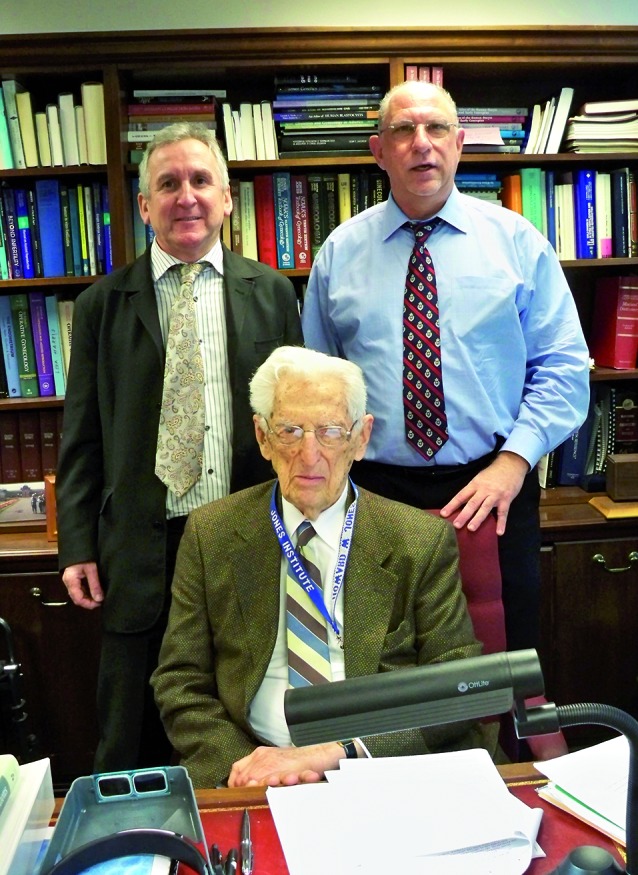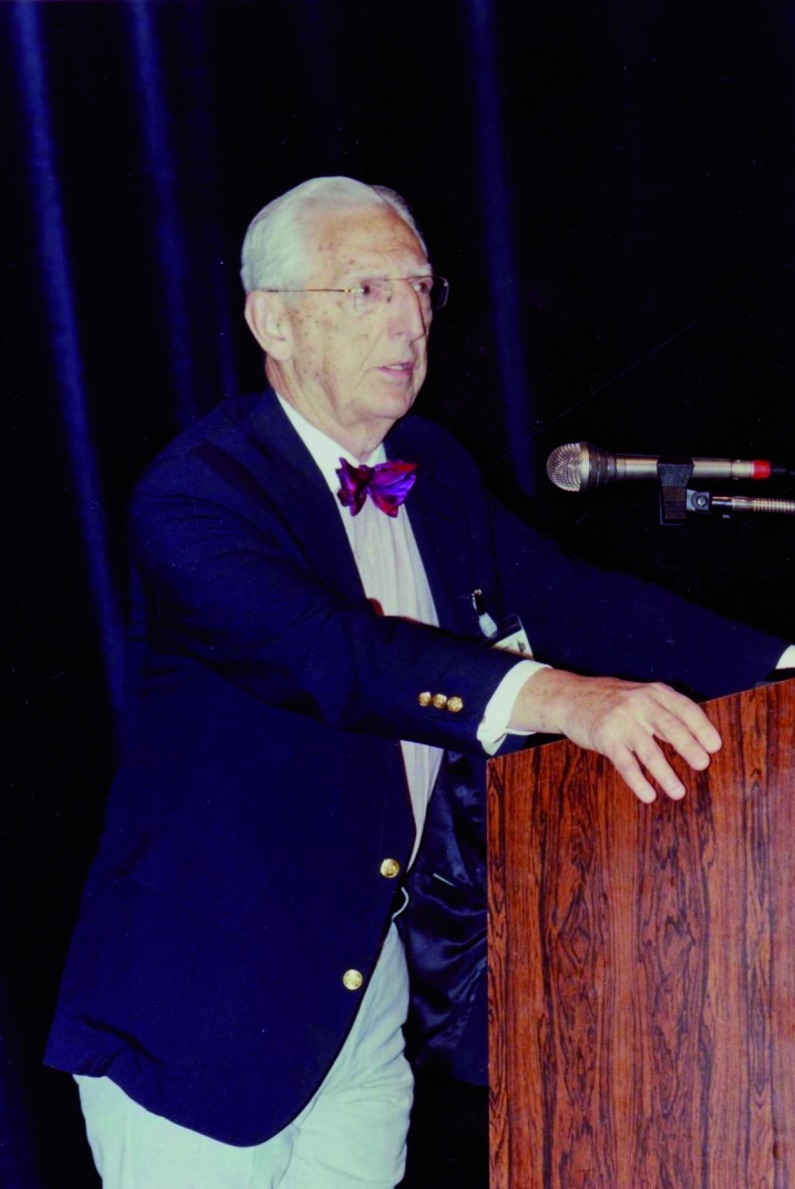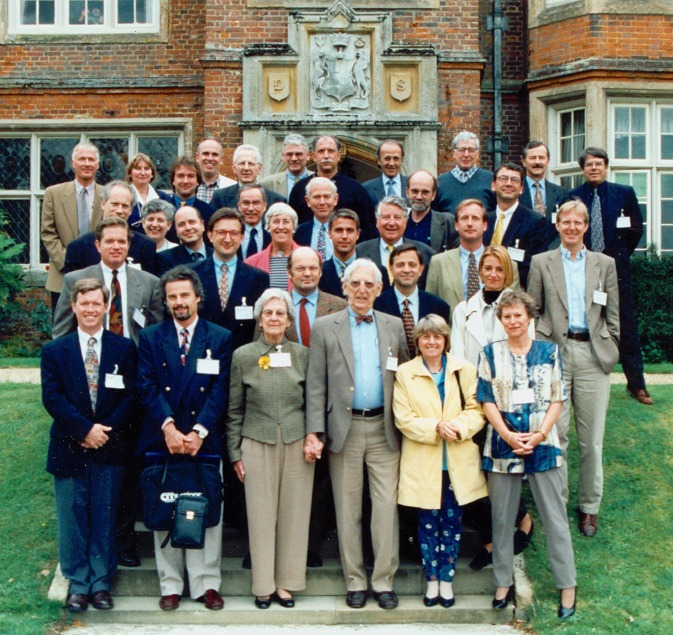Abstract
We honor the life of Howard W. Jones, Jr., MD, 104, a pioneer and visionary in reproductive medicine, a dedicated mentor, internationally renowned gynecological surgeon, and the father of in vitro fertilization IVF) in the United States. Dr. Jones founded the Jones Institute for Reproductive Medicine, in Norfolk, Virginia, at Eastern Virginia Medical School, in 1983. Today, IVF has grown exponentially not only in its direct application but also in the development of newer techniques would have been unimaginable a couple of decades ago. Throughout the years Dr. Howard has been a teacher and a mentor to many around the world. To us he also was a friend, a supporter at the time of difficult decisions, someone who would inspire hope, ignite the imagination, and instill a love of learning and untangling some of the complexities of the field, even of the human condition. His leadership, vision, knowledge, enthusiasm and inquisitive mind will be missed.
Dr. Howard as we knew him, along with his wife Dr. Georgeanna Seegar Jones, were directors of the IVF team that helped establish the first America’s “test-tube” baby who was born December, 1981, transforming reproductive medical science and propelling the field from a dream to reality. Their innovations have been the basis of an estimated over 6 million births worldwide through IVF. The impact of Dr. Howard’s work transcended the Unites States. As mentor of clinicians and scientists from all over the world, he and his Institute “exported” IVF to all corners of the world. His recent passing is a loss to all of us in reproductive medicine. Dr. Howard was a talented physician, a skilled surgeon, an innovative thinker, a prolific writer, a gentleman and a devoted family man.
Dr. Howard served with great distinction as Professor Emeritus of Obstetrics and Gynecology at Eastern Virginia Medical School. He was also Professor Emeritus at Johns Hopkins where he served as Professor of Gynecology and Obstetrics, acting Chairman of the Department, and Secretary General of the University Program for International Education. He received honorary degrees from the University of Cordoba, Old Dominion University, Amherst College, the University of Madrid, and Eastern Virginia Medical School. He is the recipient of the Medal of the College of France and the Distinguished Service Award of the American College of Obstetrics and Gynecology. He launched the first ethics committee dealing with fertility as part of the American Society for Reproductive Medicine. At the age of 103, he wrote In Vitro Fertilization Comes to America: Memoir of a Medical Breakthrough, retelling his amazing career. A year earlier, he published Personhood Revisited: Reproductive Technology, Bioethics, Religion and the Law, an exploration into the legal and ethical implications of fertility treatments and a perspective on pending legislation seeking to define the union of a sperm and egg as a person.
“The road not taken”, poem by Robert Frost, was cited by Dr. Howard in certain special occasions. The poet and author had been Dr. Howard’s English teacher at Amherst College, and had clearly made a major impact on him.
“I shall be telling this with a sigh
Somewhere ages and ages hence
Two roads diverged in a wood, and I,
I took the one less traveled by,
And that has made all the difference.”
For Dr. Howard, the “road less traveled” was his decision to explore IVF as a way to help infertile couples fulfill their wishes to have a family. Influenced by his example, Dr. Howard mastered the art of oral communication, the pitch, tone and rhythms of the spoken English language. A superb teacher and lecturer, he had this distinct ability to deliver complex ideas and opinions with impeccable clarity and graceful elegance, in that deep, firm, yet lively voice that never failed to fascinate his audiences and made him unforgettable.
Fig. 1. Bourn Hall Reunion (Cambridge, 2005).
It was by the end of his Johns Hopkins already successful career as a gynecologist and Professor Emeritus that Dr. Howard decided to explore this ‘new road’ of IVF. He felt a compelling need to develop the now called ARTs, as a novel and basic way to help infertile couples fulfill their wishes to have a family. His initial efforts followed interactions with Dr. Robert Edwards, from Cambridge, later Sir Edwards, or “Bob” as we knew him, who with his team had achieved the first pregnancy in the world with IVF using the natural cycle. It took no time for Drs. Howard and Georgeanna to develop an even more successful IVF, using hormones, and to establish the methods that almost 40 years later are still state-of-the-art throughout the world. For his achievements, Bob Edwards deservingly received the highest award, the Nobel Prize in Medicine in 2010. We have often wondered how close Dr. Howard came to being part of this honor himself.
Fig. 2. Drs. Howard Jones, Jr., Willem Ombelet and Sergio Oehninger, at Kheel Memorial Lecture (2011, Norfolk).

Today, IVF has grown exponentially not only in its direct application but also in the development of newer techniques such as the freezing of embryos for future use, the treatment of male infertility by micromanipulation with ICSI, the freezing of eggs in cases of female cancer diagnosis to preserve their fertility potential, and even to help couples that are carriers of genetic or chromosomal diseases have healthy, unaffected children. These technologies would have been unimaginable a couple of decades ago. And new exciting developments are in the horizon, all based on many of the basic concepts of IVF originally developed at the Jones Institute.
Of course, as for any other pioneering enterprise, there were obstacles in the road. Dr. Howard was very sensitive to the challenging social, ethical and religious questions raised by ART. These successful new technologies were developed at a swift pace and soon overgrew regulatory aspects, as they moved ahead faster than the law and social values. Therefore challenges and outright opposition came from every corner, not only from the religious and ethical spheres but also from the public policy perspective. Dr. Howard was the founding father of the ASRM’s ethics committee that addressed moral and ethical concerns and established guidelines for practitioners of ARTs in the US. In-house, Dr. Howard still organized quarterly ethics seminars to discuss these issues. He routinely invited participants from different perspectives and fields of study, including Psychology and Law, as well as members of the Interfaith Community, to openly address these issues, never forcing a resolution, always firmly yet respectfully presenting his opinion, and attentively hearing different points of view. Needless to say he was always the most prepared presenter among speakers!
At the age of 102, he published a book on the religious, legal and bioethical implications of ART for defining ‘personhood’. He was a prolific and to-the-point writer, and another of his books appeared just a few months ago, a memoir of the early days of IVF in the USA.
As ARTs became validated techniques and were implemented basically in all corners of the world with growing and unparalleled success, he immediately foresaw the need to answer new questions. He dedicated the last years to these challenges with fullest energy yet an open mind, particularly supporting research for identification of the best egg or embryo with highest implantation competence, not only to further increase IVF results but also aiming to decrease the burden of multiple gestations. This was his present passion and we are sure that once resolved, he would move into the next one!
We always wondered in admiration about the root of his self-motivation. What forces drove him to continue this permanent search for answers to the emerging new critical questions? He simply felt the compelling need to get these answers; he was convinced that better results could be obtained, and would not cease to find ways to explore avenues to address them.
In this regard he was unstoppable, as if following the prompt of another famous poet, the author of The Prophet: “March on. Do not tarry. Go forward. March on, and fear not the thorns, or the sharp stones on life’s path”.
Fig. 3. Drs. Howard Jones, Jr. giving a lecture at the “Andrology in the Nineties” meeting in Genk, Belgium (October 1995).

But if his self-motivation was remarkable, we found his inspirational leadership and mentorship as truly grandiose. Mirroring his own qualities, he demanded strictness, discipline and hard work from fellows and colleagues alike. He was a deeply inquisitive and original thinker; yet he introduced complex issues by asking simple questions. And his presentations were always carried out with delightful ways, occasionally humorous. He would dedicate equal time to a professor or to a medical student inquiring about a research project. He was unselfish in sharing his knowledge, as unselfish as he and the Jones Institute shared IVF with the rest of the world.
We met Dr. Howard 30 years ago. While we were of course very impressed by this imposing, awe-inspiring figure of authority from the beginning, through time we started sensing something different, a true warmth and approachability. Throughout the years Dr. Howard has been a teacher, a mentor, a friend, a supporter at the time of difficult decisions, someone who would inspire hope, ignite the imagination, and instill a love of learning and untangling some of the complexities of the field, even of the human condition.
His leadership, vision, knowledge, enthusiasm and inquisitive mind impressed everybody that was around him and so many benefitted from his teaching. His interest in different individuals as they crossed his path was indeed impressive and no matter who you were, on a Thursday evening if you were a visitor in Norfolk, he and Dr. Georgeanna would take you out to dinner. He was interested in what people were doing, their projects, and even their personal lives. He would tell us that he always learned so much from these visits and would not have missed these encounters for the world. He said: ‘I am the beneficiary of these visits.”
Dr. Howard would also make a point to emphasize the value of a good team. “You are as strong as your team” and that was one of the messages that I (TFK) took with me after the time of my 1986/87 stay in Norfolk. On a personal note he also encouraged me to stay in the discipline of reproductive medicine and not to take a management position too early in my career. “Those positions will suppress your potential and creativity he said”.
He was always optimistic about the future and when I (SO) confronted difficult decisions and approached him looking for guidance, he never discouraged me. Rather, he would say: “This is an opportunity to improve the process”.
At the time of his 100th birthday Dr. Howard said to an audience: “Let me salute you who are far more important to the future than I (am).” And one more time citing Frost, he said
“The woods are lovely, dark and deep
But I have promises to keep
And miles to go before I sleep
And miles to go before I sleep”
And he concluded: “My miles are limited and I ask those that follow me to devote miles to filling the niche that I described.”
Dr. Howard occasionally spoke to us on the cycle of life. And yes, while “life goes on” we are compelled to continue his legacy for the betterment of the field of reproductive medicine. We surely miss him and we will continue to miss him every day. His vision of an Institute “Founded on Science and Dedicated to Life” will always remain our guiding light.



